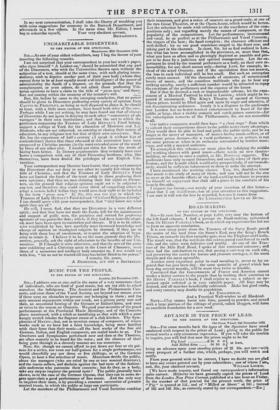MUSIC FOR THE PEOPLE.
TO THE EDITOR OF THE SPECTATOR.
Loudon, .93d December 1833.
Snt—I address you as one, and in the name of a very numerous class of individuals, who are fond of good music, but are not able to afford ourselves the indulgence. The Ancient and the Philharmonic Con- certs, and even those of the Vocal Society, are beyond our means, even if there were no obstacles to prevent our belonging to them ; and the only musical enjoyments within our reach, are a private party now and then, an occasional hearing of the German or Italian Opera, and once or twice in the season an Oratorio. We.read your accounts of the grand performances at the Provincial Music Meetings, and of the Concerts above mentioned, with a relish as tantalizing as that with which a poor hungry wretch inhales the fragrant steam of a club kitchen. The Sym- phonies of HAYDN—but, not to mention names of composers, of whose works such as we have but a faint knowledge, being more familiar with their fame than their music—all the best works of the fine old German, Italian, and English composers, are sealed books to us. The Overtures and Symphonies performed now and then at the Theatres, are often scarcely to be heard for the noise; and the chances of their being gone through in a slovenly manner are too numerous.
Now, Sir, though we cannot afford to put down our four or six gui- neas for a series, nor even our half-guinea for a single performance, we would cheerfully pay our three or five shillings,, as at the German Opera, to hear a fine selection of music. Musicians deride the public, abuse the managers (who are ruled by one or two musical directors), and-the music-sellers, and declaim against the bad taste of the fashion- able audiences who patronize their concerts ; but do they, as a body, take any step to improve the general taste? The public generally have shown, as in the case of the German Operas, that they can in some de- gree. appreciate a good performance of fine music. And the only way to improve their taste, is by providing a constant succession of genuine musical treats, in which the public at large can participate. Let the members of the Philharmonic and Vocal Societies combine I their resources, and give a series of concerts on a grand scale, at one of the two Great Theatres, or at the Opera-house, which would be better. Let the selection be made with reference to the excellence of the corn- positions only ; not regarding merely the names of composers, or the popularity of the compositions. Let the performance, instrumental.
andvocal, be as perfect as at the Philharmonic and Vocal Concerts; the singers of the best ; the band complete ; the choruses efficient and well-drilled : let us see good musicians ranged in the front row' and taking part in the choruses. In short, Sir, let us find realized in Lon- don what has been accomplished in the provinces, or, more than that, what you have so often and so glowingly depicted as possible and pro- per to be done by a judicious and spirited management. Let the ex-
periment be tried by the musical performers as a body, on their own re- sponsibility, for one short season only—during Lent, for example, in-
stead of the acted Oratorio : and if the speculation does not answer*
the loss to each individual will be but small. But such an enterprise surely must answer. Of the thousands of amateurs, of uninstructed lovers of music, and the countless multitude who go to hear any striking novelty, surely a sufficient number would be attracted to repay the exertions of the performers and the expense of the house. But if that be deemed a rash or impracticable scheme, let the expe- riment of a Musical Festival be tried in London ; which might be re- peated if encouraged. The King's Theatre, if opened at German Opera prices, would be filled again and again by eager and attentive, if not discriminating audiences. Surely it is a disgrace to the professors. that London has no better musical entertainment to boast of for the public at large, than a shabby oratorio and catch.guinea concerts—for the subscription concerts of the Philharmonic, &c. are not accessible to all.
Our native composers would then have " a clear stage" from which to submit their compositions direct to the public under every advantage. They would then be able to lead and guide the public taste, and be no longer at the mercy of managers, of money-loving music-sellers, or of capricious prima donnas—for a vocal performer, as an actress, is not the same person as when in an orchestra surrounded by, brother musi- cians, and with a musical audience. To accomplish this scheme—or some plan for indulging the middle and working classes with good music—there needs no new theatre- building, no shares to raise a capital, as Mr. RonwELL suggests. The professors have only to exert themselves, and surely a love of their pro- fession; and the benefit which would arise prospectively, if not immedi- ately, would be sufficient inducement to them to make the attempt. I have mentioned the working classes. You, Sir, doubtless know. that music is the study of many of them ; and you will not be the one to sneer at the humble efforts of the hard-working mechanic to procure for himself an enjoyment that shall add a grace to the comforts of his homely fire-side. I request the favour—not merely of your insertion of this letter about that I am indifferent—hut of your attention to this suggestion- 1 um sure it will not the less be regarded, because it comes from
AN UNINSTRUCTED LOVER OF MUSIC.
















 Previous page
Previous page